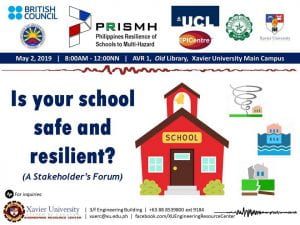PRISMH Workshop & Stakeholders Forum on Resilience of Schools to Multi-Hazard in the Philippines
By Rebekah Yore, on 4 June 2019
Last month, I was very fortunate to be able to participate in the delivery of a two-day workshop on Structural Mitigation and Increasing Resilience of Schools to Multi-Hazards in Manila, Philippines as part of the Philippines Resilience of Schools to Multi-Hazard (PRISMH) project. I joined the UCL EPICentre team in a visit to project collaborators De La Salle University (Manila) and Xavier University (Cagayan de Oro).
 The workshop was based around methods, techniques and data used and collected as part of the actual PRISMH investigation, and introduced participants (attended came from academia, government, the private sector) to the most common deficiencies and failures observed in existing school infrastructure across the Philippines. As the Philippines is a multi-hazard environment, these weaknesses were examined in reference to exposed to various types of natural hazards including earthquake, flood and windstorm. Looking at the wide variety of the building typology and unpredictability of hazard intensity, different methods of data collection and exposure analysis were demonstrated in order to prioritise the most vulnerable structures, susceptible to life threatening damage and economic losses.
The workshop was based around methods, techniques and data used and collected as part of the actual PRISMH investigation, and introduced participants (attended came from academia, government, the private sector) to the most common deficiencies and failures observed in existing school infrastructure across the Philippines. As the Philippines is a multi-hazard environment, these weaknesses were examined in reference to exposed to various types of natural hazards including earthquake, flood and windstorm. Looking at the wide variety of the building typology and unpredictability of hazard intensity, different methods of data collection and exposure analysis were demonstrated in order to prioritise the most vulnerable structures, susceptible to life threatening damage and economic losses.
 The physical integrity of buildings is only part of the story however, and the workshop also introduced knowledge and experience around challenges facing early warning systems, the identification, suitability and access to schools as emergency evacuation shelters and resource distribution hubs, as well as designing and implementing evacuation plans. I was there to represent the work and preliminary findings of Dr Joanna Faure Walker and Dr Alexandra Tsioulou, who emphasise the social importance of schools as centres of community, education institutions, and critically when a hazard risk arises, evacuation centres, emergency (and temporary) shelters, and aid distribution centres. My PhD work in the Philippines focusses on early warnings and temporary shelter in the Philippines, and so this was great way of exploring schools that function as shelters in more detail, as well as building relationships among key public, private and academic stakeholders.
The physical integrity of buildings is only part of the story however, and the workshop also introduced knowledge and experience around challenges facing early warning systems, the identification, suitability and access to schools as emergency evacuation shelters and resource distribution hubs, as well as designing and implementing evacuation plans. I was there to represent the work and preliminary findings of Dr Joanna Faure Walker and Dr Alexandra Tsioulou, who emphasise the social importance of schools as centres of community, education institutions, and critically when a hazard risk arises, evacuation centres, emergency (and temporary) shelters, and aid distribution centres. My PhD work in the Philippines focusses on early warnings and temporary shelter in the Philippines, and so this was great way of exploring schools that function as shelters in more detail, as well as building relationships among key public, private and academic stakeholders.
The workshop was followed by a Stakeholders Forum first in Manila, and then in Xavier University in the city of Cagayan de Oro (CdeO), where the fieldwork campaign for PRISMH was conducted. This was my favourite part as it was a chance to report on the initial findings of the project and to engage the people at the heart of this research. It was a wonderful example of taking work back to where it originated, and of delivering real foundations on which people can adapt and build tools and resources that can help well beyond their original scope. The attendees included the Mayor of CdeO, officials from the Regional Disaster Risk Reduction Management Council (RDRRMC) and the Philippines Department of Education.
See the Xavier University news article here
About the PRISMH Project
Start: 1st April 2017 / End: 30th Sepember 2019
The PRISMH project, led by Prof Dina D’Ayala, Dr Carmine Galasso and Dr Joanna Faure Walker aims to develop an advanced resilience assessment framework for school infrastructure subjected to multiple natural hazards in the Philippines. The project investigates the effectiveness of buildings retrofit measures and social preparedness measures as means of preventing casualties, reducing economic losses and maintaining functionality of the school infrastructure and its role within the community in the event of natural disasters. In particular the project addresses risks from seismic, wind and flood hazards. The resilience assessment protocol will be used by civil protection and school authorities to improve their preparedness and implementation.
Funding Bodies
British Council (Newton Fund Grant Agreement Institutional Links)
Philippines’s Commission on Higher Education (CHED)
 Close
Close


